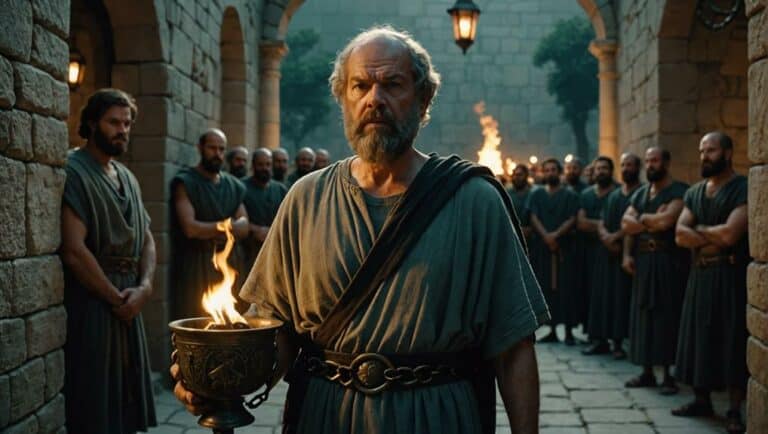The execution of Socrates by hemlock in 399 BC, following charges of impiety and corrupting the youth, became a pivotal event in philosophical history, sparking enduring debates on justice and morality.
Socrates' unwavering commitment to truth and virtue, even in the face of death, has left an indelible mark on Western thought, influencing generations of thinkers.
Socrates' Philosophical Beliefs
In the domain of philosophical inquiry, Socrates' unwavering commitment to critical questioning and self-examination stands as a cornerstone of his belief system. Through his famous assertion, 'The unexamined life isn't worth living,' Socrates implored you to prioritize introspection and the pursuit of knowledge. His philosophical beliefs were deeply rooted in ethics and morality, always aiming to uncover universal truths.
Socrates didn't merely accept traditional beliefs; instead, he challenged assumptions to reveal deeper insights. By engaging in critical questioning, he sought to dismantle preconceived notions and expose the underlying principles that govern human behavior. This rigorous method, often referred to as the Socratic method, was designed to stimulate critical thinking and illuminate the path to virtue.
His focus on self-examination wasn't just an intellectual exercise but a moral imperative. Socrates believed that through introspection, you could achieve a more profound understanding of your own values and actions, leading to a more virtuous life.
His teachings have profoundly influenced generations of thinkers, laying the groundwork for Western philosophy and highlighting the importance of a life committed to ethical inquiry and the perpetual search for universal truths.
Charges and Accusations
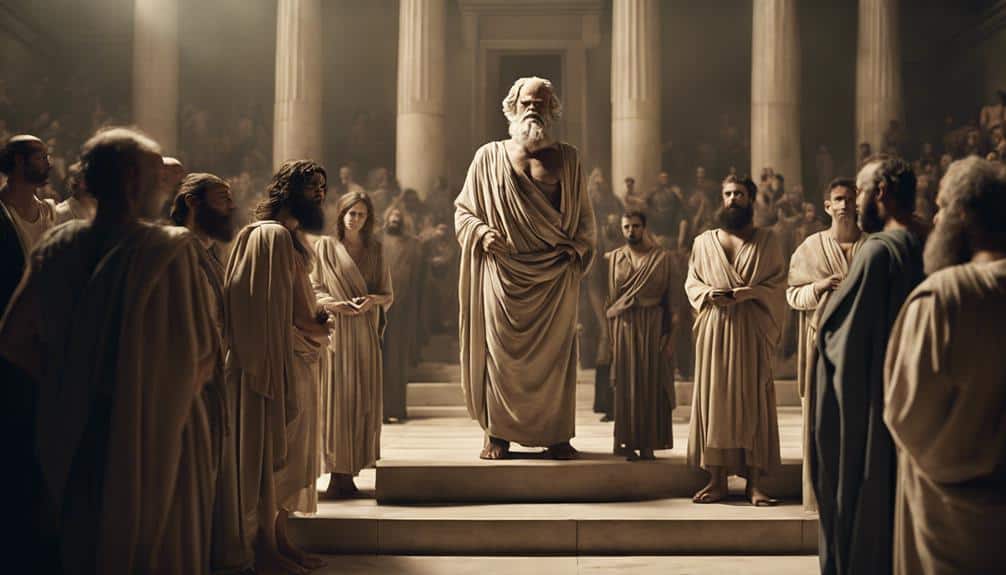
Socrates faced charges of impiety against the Athenian gods and corrupting the youth, accusations that reflected the societal and political anxieties of his time. These charges of impiety were brought by amateur prosecutors before a jury of Athenian citizens.
The impiety charge stemmed from Socrates' unconventional beliefs and his critical stance towards the traditional pantheon of gods, which many saw as a direct affront to Athenian democracy's foundational values.
The second charge, corrupting the youth, was equally potent. Socrates' teachings encouraged young Athenians to question established norms and authority, fostering a spirit of critical inquiry that alarmed many. His association with former pupils involved in anti-democratic movements only added weight to this accusation.
This charge of corrupting the youth was a reflection of the societal fears that Socrates' influence was eroding the moral fabric of Athens.
The charges against Socrates culminated in a death sentence, underscoring the severity with which the Athenian democracy viewed his actions.
The Trial of Socrates therefore serves as a critical historical moment, illustrating the complex interplay between individual philosophy and societal norms, and how deeply political tensions can influence judicial outcomes.
The Trial Proceedings
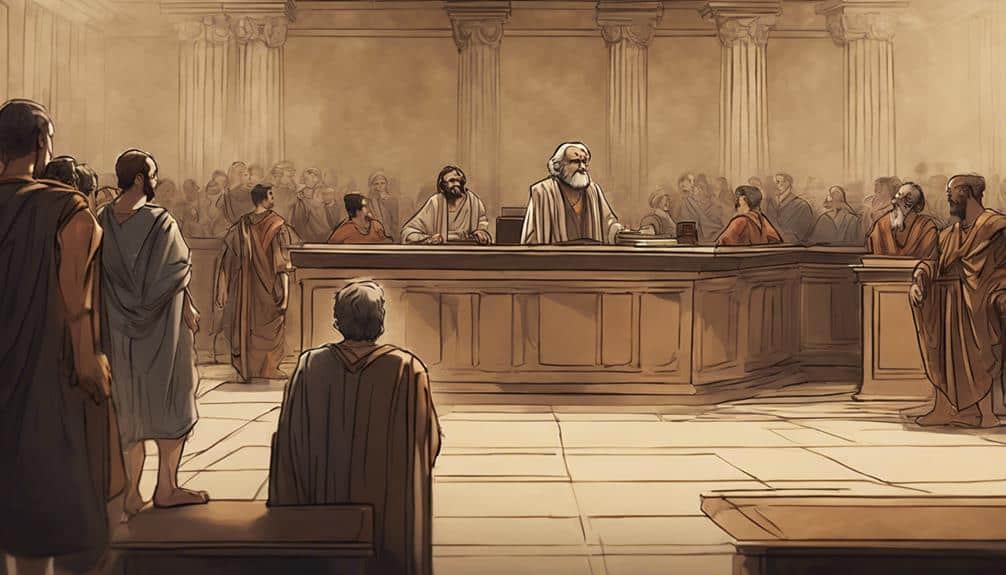
The trial proceedings unfolded with a striking intensity as the amateur prosecutors meticulously presented their case against Socrates before the jury of 500 Athenian citizens. Accused of impiety and corrupting the youth, Socrates faced allegations that he'd undermined the traditional religious beliefs and moral fabric of Athenian society. The prosecutors argued that his philosophical teachings led the young to question authority and the gods, thereby destabilizing the state.
Socrates, known for his method of relentless questioning, defended himself with a composed and logical demeanor. He challenged the validity of the accusations and the credibility of his accusers, emphasizing his role as a social and moral gadfly essential for the city's intellectual health.
Despite his eloquent defense, the jury, swayed by the fears of societal decay, found him guilty by a narrow margin of 280 to 220 votes.
Given the opportunity to propose his own punishment, Socrates suggested, rather sarcastically, that he should be rewarded for his service to Athens. However, the jury was unpersuaded and ultimately sentenced him to death.
As per Athenian law, Socrates was to drink poison hemlock, sealing his fate and marking a somber chapter in the annals of philosophical history.
The Execution by Hemlock
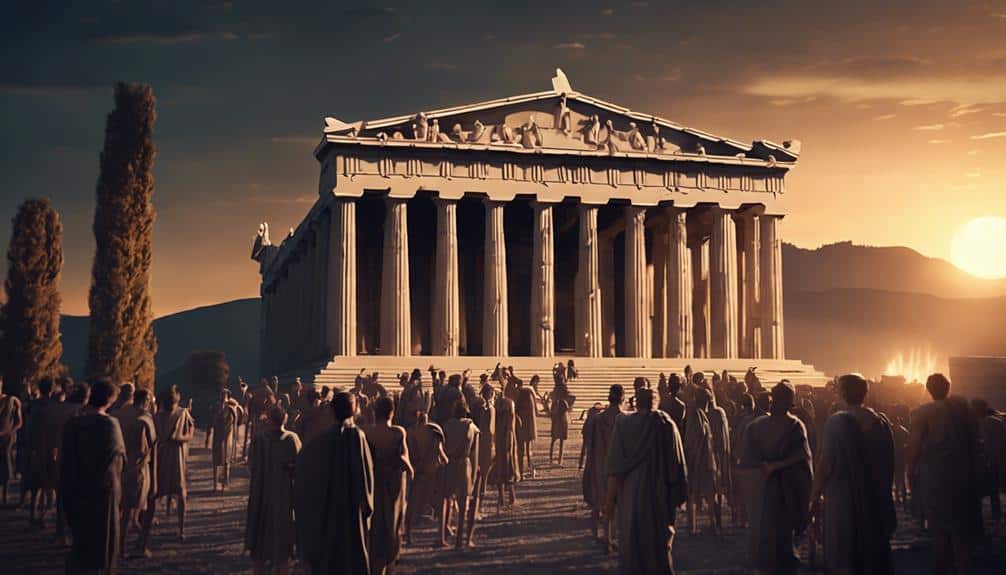
You witness Socrates' stoic final moments as he willingly consumes the hemlock, adhering to Athenian law.
The hemlock's lethal effects, inducing paralysis and respiratory failure, highlight the grim reality of his execution.
Socrates' calm demeanor in his last hours underscores his unwavering commitment to his philosophical principles.
Socrates' Stoic Final Moments
Amid the unfolding tragedy, Socrates' serene acceptance of his destiny, as he drank the hemlock, exemplified his unwavering philosophical convictions.
In his final moments, Socrates peacefully drank the hemlock, fully aware that this execution by hemlock was the legally mandated penalty for his conviction of impiety and corrupting the youth. His composed demeanor during the execution highlighted his acceptance of the death sentence. Witnesses recount that, despite the gravity of the situation, Socrates maintained a calm and even cheerful attitude while consuming the poison, a tribute to his profound commitment to his beliefs.
Socrates' demeanor wasn't merely a facade but a reflection of his philosophical stance. He believed in the pursuit of virtue and wisdom, even in the face of death. By accepting his destiny without resistance, he demonstrated the principles he'd lived by, illustrating the notion that a true philosopher doesn't fear death.
His actions underscored the idea that adherence to one's ethical and philosophical principles should remain steadfast, regardless of the consequences. Thus, Socrates' final moments were marked by a dignified composure that served as the ultimate affirmation of his life's work and teachings.
Hemlock's Lethal Effects
How did the lethal effects of hemlock, specifically the coniine-induced respiratory paralysis, culminate in Socrates' tragic demise?
The execution of Socrates by hemlock under Athenian law exemplifies a methodical application of toxicology to enforce capital punishment.
Hemlock's primary toxic component, coniine, disrupts nerve impulses by binding to nicotinic acetylcholine receptors, leading to progressive muscle weakness.
Upon ingestion, the poison systematically impairs muscular function.
Socrates, following the legal dictates of his time, drank a mixture of hemlock and water. Initially, the coniine caused symptoms such as nausea and vomiting, but the toxin's most profound impact was on the respiratory system.
As the coniine continued to interfere with nerve impulses, the muscles essential for breathing—primarily the diaphragm and intercostal muscles—began to fail.
This respiratory paralysis is the pivotal mechanism leading to death.
With the muscles unable to contract, breathing became increasingly labored until it ceased entirely.
Socrates' execution by hemlock culminated in a tragic demise, marked by a scientific, yet deeply human, struggle against the poison's inexorable effects.
The methodical progression from muscle weakness to respiratory failure underscores the lethal efficiency of hemlock as an instrument of justice in ancient Greece.
Historical and Artistic Depictions
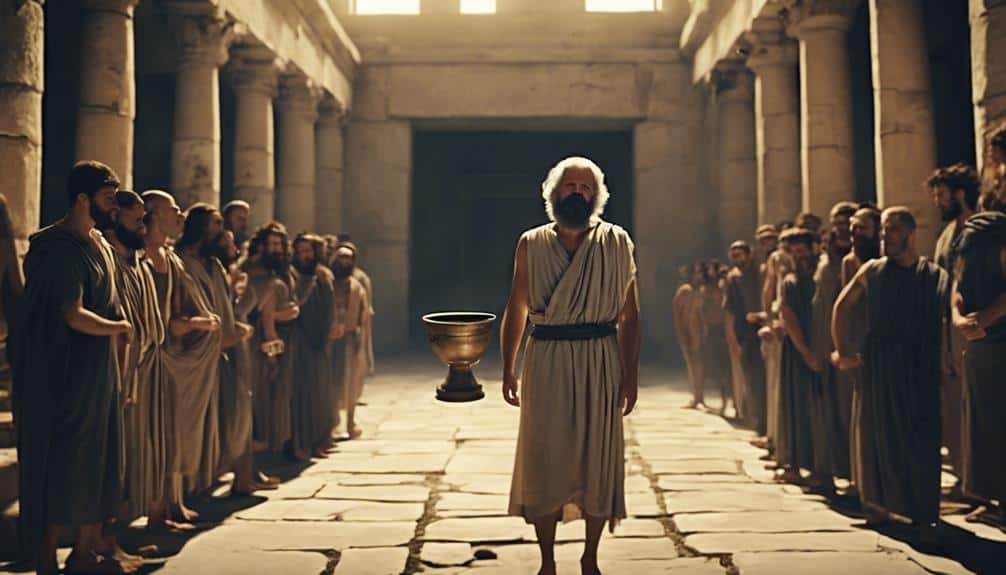
In examining the historical and artistic depictions of Socrates' execution, one finds a profound reflection of the philosophical and societal tensions of ancient Athens. The trial and execution of Socrates in 399 BC, where he was found guilty of impiety and corrupting the youth, encapsulate the friction within the Athenian system. These events aren't mere historical footnotes but deeply significant moments captured in various artistic interpretations.
Jacques-Louis David's painting 'The Death of Socrates' stands out as a pivotal artistic depiction. This work vividly illustrates Socrates' final moments, emphasizing his stoic acceptance of the hemlock, a powerful symbol of his unwavering commitment to his principles. The painting not only portrays the physical act of drinking the poison but also subtly critiques the societal tensions and political turmoil that led to such a tragic end.
Through these depictions, you gain insight into how Socrates' trial and execution were perceived and interpreted. They offer a lens to understand the broader implications of his death within the context of Athenian society. Such historical and artistic representations continue to evoke reflection on the enduring conflict between individual philosophy and societal norms.
Legacy and Influence
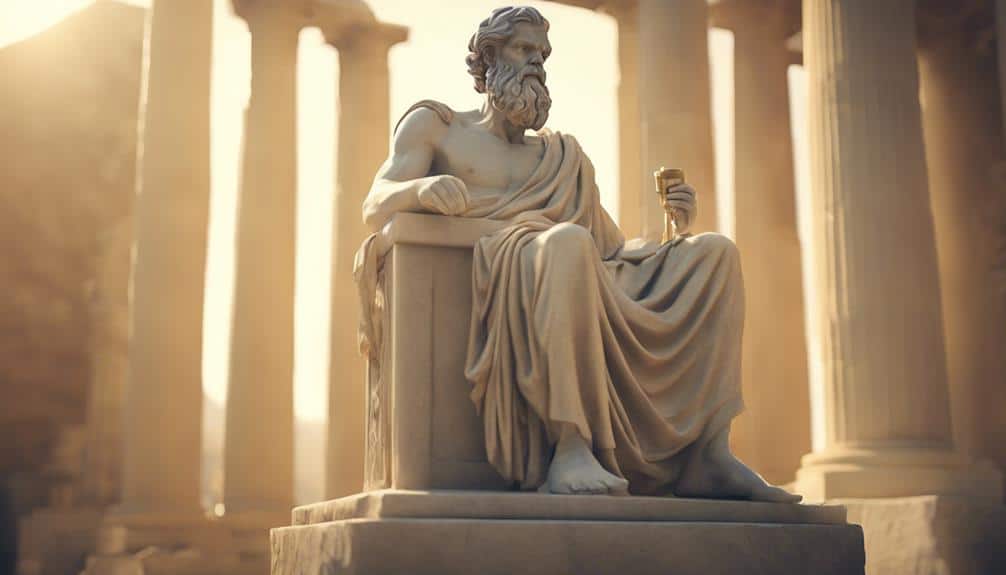
Socrates' execution, far from silencing his ideas, galvanized a legacy that profoundly shaped Western philosophical thought. As a philosopher and martyr, his commitment to truth and virtue in the face of death became a beacon of moral courage and intellectual integrity. His trial and subsequent death didn't just end his life but ignited a firestorm of contemplation on justice, ethics, and the pursuit of knowledge.
You'll find that Socrates' influence is most evident in the works of his disciples, particularly Plato and Aristotle. Plato's dialogues immortalize Socrates' methods and philosophies, ensuring that his ideas continued to challenge and inspire future generations. Aristotle, too, built upon the foundations laid by Socratic thought, advancing Western philosophy in ways that still resonate today.
Moreover, Socrates' willingness to die for his beliefs challenged societal norms and sparked enduring debates about the nature of authority and morality. His execution is a profound reminder of the cost of intellectual integrity and moral courage. The story of his trial and death compels you to reflect on the ethical dimensions of power and the relentless pursuit of truth, hallmarks of his enduring legacy.


